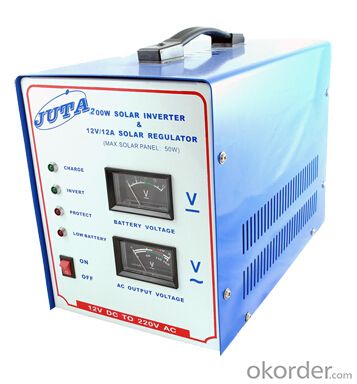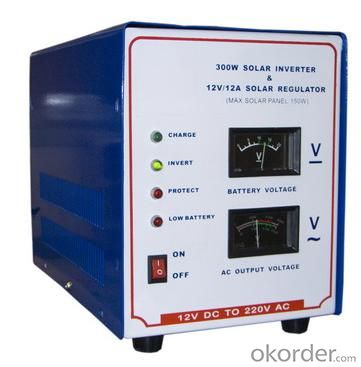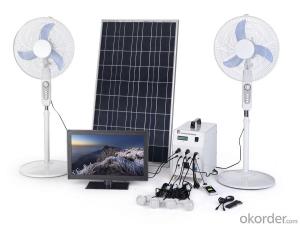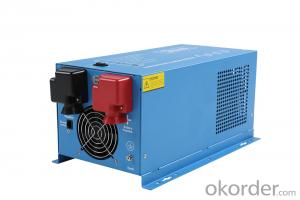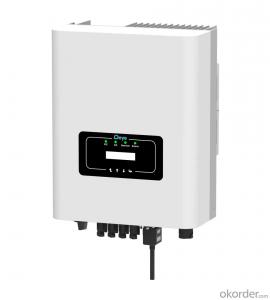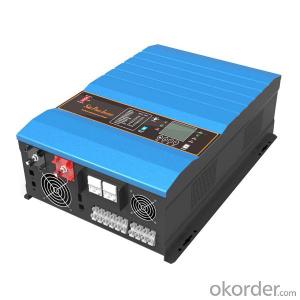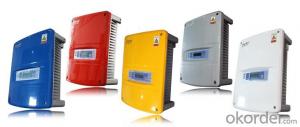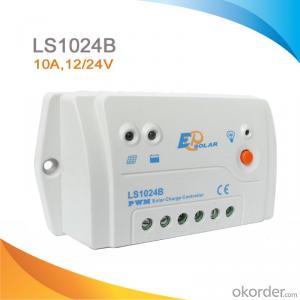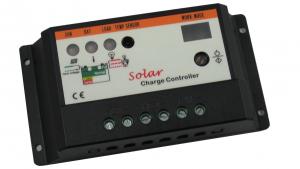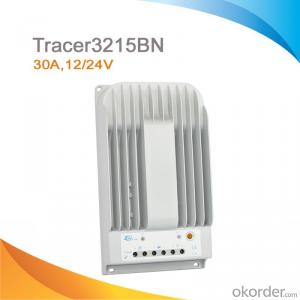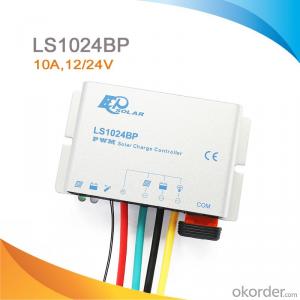200W Solar Inverter with Built-in Controller
- Loading Port:
- Shanghai
- Payment Terms:
- TT OR LC
- Min Order Qty:
- 10 unit
- Supply Capability:
- 50 unit/month
OKorder Service Pledge
OKorder Financial Service
You Might Also Like
1. Structure of 200W Solar Inverter with Built-in Controller
This Inverter with Built in Controller could uninterruptible charge the battery at day time with solar panel, adjust the charge current according to the voltage of battery to prolong life time of battery, float charging which could make battery always to be fully state for urgent power supply. Besides this product also have reverse current protection from battery to solar panel.
2. Main Features of 200W Solar Inverter with Built-in Controller
Battery Low Voltage Protection
DC Input Overvoltage Protection.
Overload Protection
Short Circuit Protection
Thermal Protection
Fault Indication Function
3. 200W Solar Inverter with Built-in Controller Images
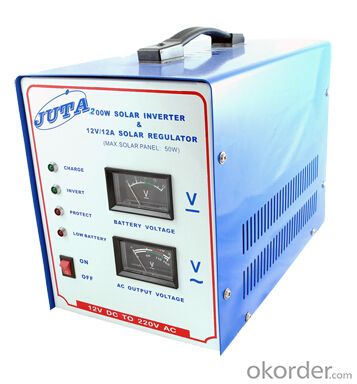
4. 200W Solar Inverter with Built-in Controller Specification
Max. current for solar power charging | 12A |
Max. USB output current | 600mA |
Max. DC socket output current | 2A |
Input voltage | DC10—14V |
Output power | ≤200W |
Input current | 0.5—25A |
No-load loss | ≤1.5% |
Output wave shape | Modified |
Output voltage | AC 205—230V |
Accumulator charging off voltage | 14V |
Accumulator supply off voltage | 10.2V |
Accumulator supply recovery voltage | 12.6V |
Output frequency | 50—60HZ |
5. FAQ
We have organized several common questions for our clients, which may help you sincerely:
1 ) How to guarantee the quality of the products?
The company presses the ISO9000 quality management system control product quantity strictly, the export production all passes the relevant national company check (CE, ROHS), and get high evaluation of the customer.
2 ) How long can we receive the product after signing Sales Confirmation?
Generally speaking, if there is enough quantity of finished products which can meet the clients’ requirement, we can manage the delivery within three to five working days according to the instruction of the payment terms in the Sales Confirmation; if the products need some time to get ready, we will arrange thedelivery as soon as possible after the manufacture.
- Q: How does a solar controller handle battery capacity testing?
- A solar controller handles battery capacity testing by monitoring the voltage and current flow in and out of the battery. It typically measures the battery's voltage at regular intervals and calculates the state of charge (SOC) based on predefined voltage thresholds. By analyzing the SOC over time, the solar controller can estimate the battery's capacity and determine if it needs to be charged or discharged for optimal performance.
- Q: How does a solar controller handle battery balancing?
- A solar controller handles battery balancing by monitoring the charging and discharging of individual batteries in a battery bank. It ensures that each battery receives an equal amount of charge and prevents overcharging or undercharging of any battery. The controller adjusts the charging current and voltage levels to maintain a balanced state among the batteries, maximizing their lifespan and overall performance.
- Q: Can a solar controller be used with a solar-powered food processing facility?
- Yes, a solar controller can be used with a solar-powered food processing facility. A solar controller is essential in managing and optimizing the power generated by solar panels. It regulates the flow of electricity, protects batteries from overcharging or discharging, and ensures efficient energy utilization. In a solar-powered food processing facility, a solar controller would help maintain a stable and reliable power supply, enabling smooth operations and reducing reliance on non-renewable energy sources.
- Q: Can a solar controller handle power surges from appliances?
- No, a solar controller is not designed to handle power surges from appliances. Its main function is to regulate and control the flow of power from solar panels to the battery bank, ensuring optimal charging and preventing overcharging. Power surges from appliances typically require surge protectors or other specialized devices to handle and protect against sudden spikes in electrical current.
- Q: Can a solar controller be used with solar panel ground screws?
- Yes, a solar controller can be used with solar panel ground screws. A solar controller is responsible for regulating the amount of electricity flowing from the solar panels to the batteries. The use of ground screws to secure the solar panels does not affect the compatibility or functionality of the solar controller.
- Q: How do I determine the maximum load capacity of a solar controller?
- To determine the maximum load capacity of a solar controller, you should refer to the manufacturer's specifications or product documentation. This information will typically include the maximum load capacity or wattage rating that the controller can handle. It is important to ensure that the load capacity of the solar controller is sufficient for the devices or appliances you intend to connect to it, as exceeding the maximum load capacity can lead to damage or malfunction.
- Q: Can a solar controller be used with solar street lights?
- Yes, a solar controller can be used with solar street lights. A solar controller helps regulate and optimize the charging of the batteries connected to the solar street lights. It ensures that the batteries receive the right amount of solar energy and prevents overcharging or discharging. This helps prolong the lifespan of the batteries and enhances the performance of the solar street lights.
- Q: Can a solar controller be used with solar arrays of different voltages?
- Yes, a solar controller can be used with solar arrays of different voltages. Solar controllers are designed to regulate the charging of batteries from solar panels, and they typically have the capability to handle a range of input voltages. They are equipped with features like voltage regulation and maximum power point tracking (MPPT) to ensure compatibility with various solar array voltages.
- Q: Does a solar controller have a built-in light sensor?
- Yes, a solar controller typically has a built-in light sensor. This sensor helps to detect the level of sunlight and adjust the charging or discharging of the battery accordingly.
- Q: Can a solar controller be used with solar panel arrays?
- Yes, a solar controller can be used with solar panel arrays. A solar controller regulates the voltage and current from the solar panels, ensuring optimal charging and preventing overcharging of batteries. It is an essential component in solar systems, including solar panel arrays, to maximize efficiency and protect the batteries.
Send your message to us
200W Solar Inverter with Built-in Controller
- Loading Port:
- Shanghai
- Payment Terms:
- TT OR LC
- Min Order Qty:
- 10 unit
- Supply Capability:
- 50 unit/month
OKorder Service Pledge
OKorder Financial Service
Similar products
Hot products
Hot Searches
Related keywords


